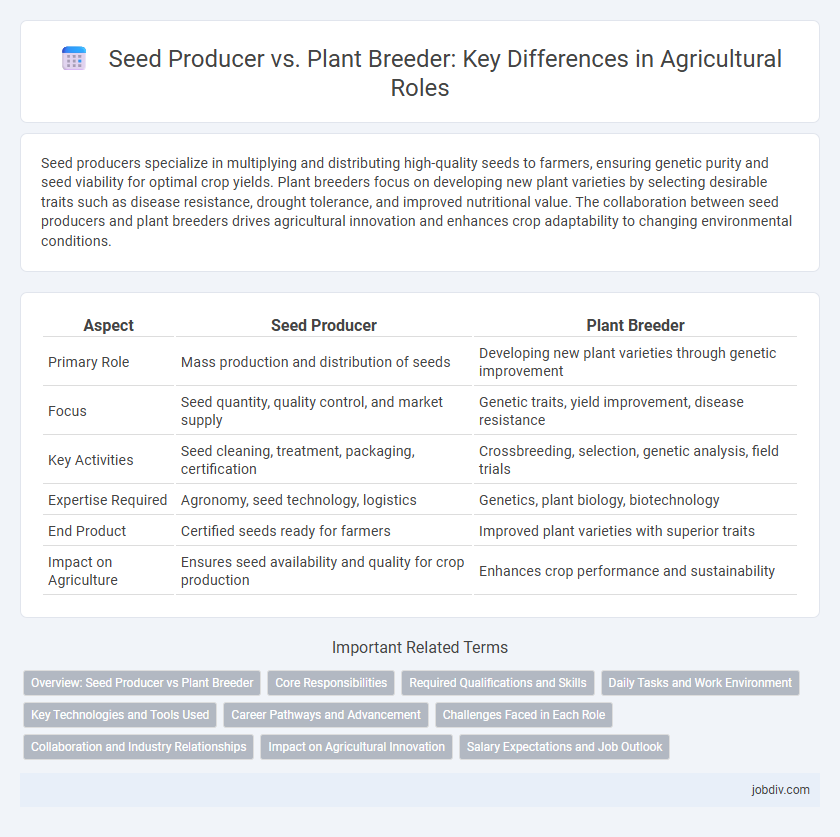Seed producers specialize in multiplying and distributing high-quality seeds to farmers, ensuring genetic purity and seed viability for optimal crop yields. Plant breeders focus on developing new plant varieties by selecting desirable traits such as disease resistance, drought tolerance, and improved nutritional value. The collaboration between seed producers and plant breeders drives agricultural innovation and enhances crop adaptability to changing environmental conditions.
Table of Comparison
| Aspect | Seed Producer | Plant Breeder |
|---|---|---|
| Primary Role | Mass production and distribution of seeds | Developing new plant varieties through genetic improvement |
| Focus | Seed quantity, quality control, and market supply | Genetic traits, yield improvement, disease resistance |
| Key Activities | Seed cleaning, treatment, packaging, certification | Crossbreeding, selection, genetic analysis, field trials |
| Expertise Required | Agronomy, seed technology, logistics | Genetics, plant biology, biotechnology |
| End Product | Certified seeds ready for farmers | Improved plant varieties with superior traits |
| Impact on Agriculture | Ensures seed availability and quality for crop production | Enhances crop performance and sustainability |
Overview: Seed Producer vs Plant Breeder
Seed producers specialize in multiplying high-quality seeds for commercial distribution, ensuring genetic purity and consistent germination rates to meet market demands. Plant breeders focus on developing new plant varieties with improved traits such as disease resistance, yield, and environmental adaptability through genetic selection and hybridization techniques. The collaboration between seed producers and plant breeders is essential for advancing agricultural productivity and sustainability.
Core Responsibilities
Seed producers focus on multiplying and distributing high-quality seeds that meet regulatory standards and ensure genetic purity for commercial agriculture. Plant breeders develop new plant varieties by applying genetic techniques, selecting traits like yield, disease resistance, and climate adaptability to improve crop performance. Both roles are critical in enhancing agricultural productivity and sustainability through innovation and quality control.
Required Qualifications and Skills
Seed producers typically require expertise in agronomy, quality control, and regulatory compliance to ensure high-quality seed multiplication and distribution. Plant breeders need advanced knowledge in genetics, biotechnology, and data analysis to develop improved crop varieties with desired traits. Both roles demand strong problem-solving abilities, attention to detail, and familiarity with agricultural technology and sustainability practices.
Daily Tasks and Work Environment
Seed producers focus on cultivating and harvesting high-quality seeds, managing planting schedules, irrigation, and pest control to ensure optimal seed yield. Plant breeders conduct genetic research, cross-breeding plants to develop improved crop varieties with desirable traits such as disease resistance or higher productivity. Seed producers typically work in outdoor agricultural settings, while plant breeders often combine fieldwork with laboratory research in controlled environments.
Key Technologies and Tools Used
Seed producers rely heavily on advanced mechanical harvesting equipment, seed cleaning machines, and precision planting technology to ensure high-quality seed output. Plant breeders utilize cutting-edge genomic selection tools, molecular markers, and CRISPR gene-editing technologies to develop improved crop varieties with desirable traits. Both sectors increasingly adopt data analytics and remote sensing techniques for enhanced crop management and performance evaluation.
Career Pathways and Advancement
Seed producers focus on the large-scale cultivation and distribution of high-quality seeds, often advancing through roles in crop management and agricultural operations. Plant breeders specialize in developing new plant varieties using genetics and biotechnology, progressing toward senior research scientist or geneticist positions. Career advancement in plant breeding typically requires advanced degrees in plant science or genetics, while seed producers benefit from expertise in agricultural technology and supply chain management.
Challenges Faced in Each Role
Seed producers encounter challenges such as maintaining genetic purity, ensuring high seed quality, and managing large-scale production logistics to meet market demand. Plant breeders face difficulties in developing new cultivars resistant to pests, diseases, and climate change while balancing traits like yield and nutritional value. Both roles require navigating regulatory approvals and adapting to evolving agricultural technologies to sustain crop improvement.
Collaboration and Industry Relationships
Seed producers and plant breeders collaborate closely to enhance crop varieties, combining advanced genetic research with large-scale seed multiplication. Strong industry relationships facilitate the exchange of proprietary germplasm and innovative breeding techniques, accelerating the development of high-yield, disease-resistant seeds. This synergy supports sustainable agriculture by delivering improved seeds that meet market demands and environmental challenges.
Impact on Agricultural Innovation
Seed producers primarily focus on the large-scale multiplication and distribution of genetically stable seeds, ensuring farmers have access to high-quality planting material, which supports consistent crop yields and food security. Plant breeders drive agricultural innovation by developing new crop varieties with improved traits such as disease resistance, drought tolerance, and enhanced nutritional value, directly impacting crop performance and sustainability. The collaboration between seed producers and plant breeders accelerates the adoption of cutting-edge genetic improvements, fostering resilience and productivity in modern agriculture.
Salary Expectations and Job Outlook
Seed producers typically earn salaries ranging from $30,000 to $50,000 annually, reflecting roles centered on seed cultivation and quality control, while plant breeders command higher earnings between $60,000 and $90,000 due to specialized genetic research and development responsibilities. The job outlook for plant breeders is robust, with a projected growth rate of 5-7% over the next decade driven by advancements in crop improvement technologies. Seed producers face steady demand tied to agricultural cycles and seed supply chains, but opportunities may be more stable than rapidly growing compared to breeding specialists.
Seed Producer vs Plant Breeder Infographic

 jobdiv.com
jobdiv.com